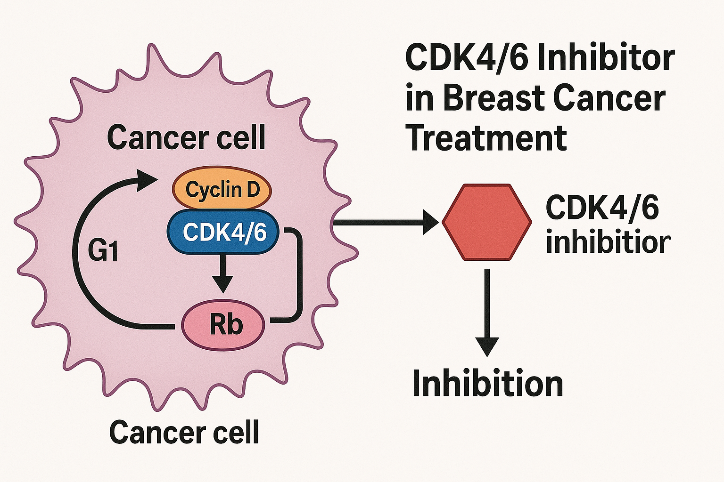In addition to chemotherapy and hormone therapy, there are newer, more effective treatments that can attack specific breast cancer cells without harming normal cells. Currently, these targeted methods are commonly used in combination with traditional chemotherapy. However, targeted drugs often have less severe side effects than standard chemotherapy drugs.
How do breast cancer targeted therapies work?
Breast cancer targeted therapy uses drugs that block the growth of breast cancer cells in specific ways. For example, targeted therapy may block the action of an abnormal protein (such as HER2) that stimulates the growth of breast cancer cells. For example, Trastuzumab (Herceptin®) or lapatinib (TYKERB®) may be given to a woman whose lab tests show that her breast tumor has too much HER2.


Monoclonal Antibodies: Binding Agents For Cancer Cells
One type of targeted therapy currently being studied is monoclonal antibodies. These laboratory-manufactured proteins bind with certain cancers.
Herceptin: Targeting HER2-Positive Receptors
Monoclonal antibody drugs such as Herceptin (also known as Trastuzumab) target HER2-positive tumors. If cancer cells are positive for the HER2/neu receptors that means there is an overabundance of receptors on the cancer cell for the growth-stimulating HER2 protein.
The tumor acts almost like a magnet for growth hormones, and when the tumor cells connect with growth hormone cells, the cancer can quickly grow and multiply. Herceptin helps shrink these HER2-positive tumors by finding the cells, binding with them, and blocking the action of the receptor.
How is Herceptin administered and what are the likely side effects?
This drug is given through a vein. It may be given alone or with chemotherapy. Side effects that most commonly occur during the first treatment include fever and chills.
Other possible side effects include weakness, nausea, vomiting, diarrhea, headaches, difficulty breathing, and rashes. These side effects generally become less severe after the first treatment. Herceptin also may cause heart damage, heart failure, and serious breathing problems. Before and during treatment, your doctor will check your heart and lungs.

Lapatinib: blocking abnormal proteins that signal cancer cells to multiply
This tablet, taken by mouth, helps stop or slow the spread of cancer cells. Lapatinib is given with chemotherapy or after other methods have not worked to slow the cancer.
Side effects can include nausea, vomiting, diarrhea, tiredness, mouth sores, and rashes. It can also cause red, painful hands and feet. Before treatment, your doctor will check your heart and liver. During treatment, your doctor will watch for signs of heart, lung, or liver problems.
As with all medical treatments, if you experience unusual changes in your health during targeted therapy, notify your doctor immediately.

CDK 4/6 Inhibitor Drugs
Drugs like Palbociclib (Ibrance), Ribociclib (Kisqali), and Abemaciclib (Verzenio)are typically used to treat hormone receptor-positive, HER2-negative metastatic or advanced breast cancer. The drug is often administered orally in combination with hormone therapies to block Cyclin-dependent kinase 4 and 6 (CDK 4/6) proteins that allow cancer cells to divide, slowing the progression of the disease.
Advantages of CDK 4/6 Inhibitors
Studies have shown that adding CDK 4/6 inhibitors to standard hormone therapy significantly prolongs the length of time a patient lives without their cancer growing or spreading. (progression-free survival), and the length of time patients live from the start of treatment (overall survival), and reduces the risk of cancer spread (metastasis), and improves quality of life.
Most Common Side Effects
These drugs are generally well- tolerated. Some of the most common side effects include: low white blood cell count (neutropenia), fatigue, nausea, diarrhea, hair thinning, increased liver enzymes, mouth sores
Note: Not everyone will experience all side effects, and some may experience none at all. It’s important to discuss any concerns with your doctors, as they can help manage side effects and adjust the treatment if needed.

Immune- modulating Therapy
These medicines treat breast cancer by targeting specific receptors on breast cancer cells. They can help fight breast cancer by alerting the immune system to destroy cancer cells. Because of this, they are sometimes called “immune targeted therapies.”
Pembrolizumab (Keytruda) is an example of immune targeted drug that is used in combination with chemotherapy to treat triple-negative breast cancer that is unresectable (can’t be removed with surgery), locally advanced or metastatic, and has PD-L1 receptor.
It is also used in combination with chemotherapy before surgery, and then on its own after surgery to treat early-stage triple-negative breast cancer with a high risk of recurrence (the cancer coming back).




